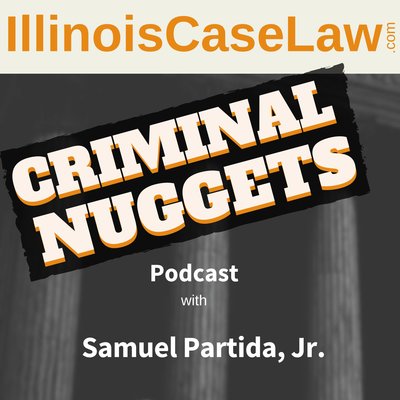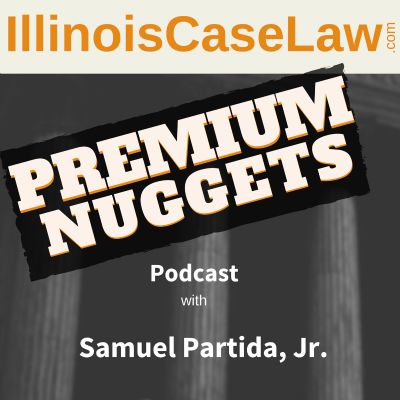May 29, 2020
People v. Markham, 2019 IL App (3d) 180071 (April). Episode 626 (Duration 7:32)
State says overdose immunity should not kick in since defendant was feeling good enough to ask for his wallet and keys.
Gist
This is a possession of heroin case.
Facts
The parties submitted the following stipulated facts for the court’s consideration:
“1. A female companion and the defendant used heroin;
2. After going out into the kitchen and playing with her phone for
a few minutes, the female companion re-entered the bedroom and
observed the Defendant sitting in the bed turning purple;
3. Defendant was suffering a drug overdose;
4. The female then called 911 and commenced CPR;
5. Tazewell County Deputies were dispatched to [the home] in
regards to a possible drug overdose;
6. When Deputies arrived they found [defendant] non-responsive and
not breathing, and they commenced performing CPR on him;
7. One Deputy observed a syringe on a bedside table near the
television;
8. As [defendant] was being prepped to be moved from the room to
the ambulance, he began breathing on his own, eventually regaining
consciousness;
9. As [defendant] was being prepared to be transported to the
hospital, he requested his wallet and house keys from out of the
closet to take with him to the hospital;
10. Deputy McKinney went into the closet to gather [defendant’s]
wallet and keys;
11. Deputy McKinney found contraband (a rolled up dollar bill)
sticking out of the wallet;
12. Inside the rolled up bill was a gray wrapper that appeared to
be a gum wrapper which contained a grayish-white substance;
13. The grayish-white substance field tested positive for
heroin;
14. That the amount of the substance recovered by law enforcement
is within the amount identified in subsection (d) of 720 ILCS
570/414, which is less than 3 grams of a substance containing
heroin;
15. That [defendant] is charged with Unlawful Possession of a
Controlled Substance, 720 ILCS 570/402(c);”
By agreement, the parties further supplemented the stipulated facts, listed above, to provide that “[t]he deputies were administering CPR, and at that time North Pekin officers arrived and administered two doses of Narcan to the defendant. The deputies continued the CPR. At that point [defendant’s] pulse came back, but he was not breathing on his own. And then— and to clarify, paramedics then arrived, and paramedics administered the two subsequent doses of Narcan.”
Issue
At issue in this appeal is whether law enforcement “acquired” the heroin in defendant’s wallet “as a result” of defendant obtaining “emergency medical assistance” or whether law enforcement discovered the heroin after the “emergency medical assistance” concluded and defendant’s condition became somewhat stable.
Overdose Immunity
Defendant filed a motion to dismiss the charge based on the statutory immunity from prosecution provision of section 414(c) of the Act )(720 ILCS 570/414(c)).
Section 414 of the Act, titled “Overdose; limited immunity from prosecution,” provides:
“(a) For the purposes of this Section, ‘overdose’ means a controlled substanceinduced physiological event that results in a life-threatening emergency to the individual who ingested, inhaled, injected or otherwise bodily absorbed a controlled, counterfeit, or look-alike substance or a controlled substance analog.
(b) A person who, in good faith, seeks or obtains emergency medical assistance for someone experiencing an overdose shall not be charged or prosecuted for Class 4 felony possession of a controlled, counterfeit, or look-alike substance or a controlled substance analog if evidence for the Class 4 felony possession charge was acquired as a result of the person seeking or obtaining emergency medical assistance and providing the amount of substance recovered is within the amount identified in subsection (d) of this Section.
(c) A person who is experiencing an overdose shall not be charged or prosecuted for Class 4 felony possession of a controlled, counterfeit, or look-alike substance or a controlled substance analog if evidence for the Class 4 felony possession charge was acquired as a result of the person seeking or obtaining emergency medical assistance and providing the amount of substance recovered is within the amount identified in subsection (d) of this Section. * * *
(e) The limited immunity described in subsections (b) and (c) of this Section shall not be extended if law enforcement has reasonable suspicion or probable cause to detain, arrest, or search the person described in subsection (b) or (c) of this Section for criminal activity and the reasonable suspicion or probable cause is based on information obtained prior to or independent of the individual described in subsection (b) or (c) taking action to seek or obtain emergency medical assistance and not obtained as a direct result of the action of seeking or obtaining emergency medical assistance.”
Purpose Of The Act
The public act enacting section 414 of the Act includes a preamble stating, in relevant part:
“WHEREAS, Drug-overdose deaths are the second leading cause of accidental death in the nation and deaths have increased significantly in recent years, in both the Chicago Metropolitan Area and across Illinois; and
WHEREAS, The General Assembly finds that drug-overdose deaths could be substantially decreased if immunity from criminal prosecution for Class 4 felony violations of the Illinois Controlled Substances Act and Class 3 felony violations of the Methamphetamine Control and Community Protection Act were granted to a person possessing a small amount of the drug who, in good faith, seeks emergency medical assistance for someone experiencing a drug-related overdose and if this immunity were granted for the same Class 4 felony violations of the Illinois Controlled Substances Act and the Class 3 felony violations of the Methamphetamine Control and Community Protection Act to a person who is experiencing a drug-related overdose[.]”
Pub. Act 97- 678, § 5 (eff. June 1, 2012) (adding 720 ILCS 570/414).
People v. Teper
See Episode 264 – People v. Teper, 2016 IL App (2d) 160063 (November) (defendant found slumped over in his car but drug possession prosecution was still allowed).
Here, the State suggests the emergency ended before the discovery of the heroin by law enforcement.
Based on these circumstances, the State submits that defendant cannot rely on the statutory immunity provisions of the Act once the true emergency requiring emergency medical assistance was resolved. The State cites People v. Teper, 2016 IL App (2d) 160063, in support of its argument.
In Teper, officers received numerous reports of a driver slumped over her steering wheel in traffic. Upon arrival at the scene, officers first observed several hypodermic syringes, and one officer observed two Baggies of a brown rock-like substance in the vehicle. Based solely on the officer’s observations of the defendant’s physical appearance and the items in plain view inside the vehicle, the officers concluded the driver was likely experiencing an overdose and made the decision to administer Narcan.
In that case, the trial court determined that immunity from prosecution based on section 414 did not apply because “the triggering fact” for overdose intervention occurred after the officers observed suspected drugs and paraphernalia in plain view. Id. ¶ 12. In other words, the trial court found the officers were not summoned to the scene with knowledge of a drug overdose and developed probable cause to seize the contraband before realizing the driver was incapacitated due to a drug overdose.
The Second District Appellate Court affirmed the trial court’s ruling.
The reviewing court opined that, because the contraband was clearly and immediately visible, thereby establishing independent probable cause prior to the defendant obtaining emergency medical assistance, the statutory exception to immunity from prosecution set forth in section 414(e) of the Act was triggered.
This Call Was More Specific
Unlike Teper, the initial 911 call here conveyed the urgent necessity for emergency medical services due to a drug overdose in progress, triggering statutory immunity from the outset.
Further, emergency medical assistance was in progress when an officer discovered contraband.
For these reasons, we find Teper is factually distinguishable from the case at bar. The State contends the fact that defendant was physically able to make a request for his wallet and keys should have caused the trial court to conclude defendant was past the point of requiring emergency medical assistance. In fact, the State posits “it is impossible to argue defendant, at the moment he asked the question, was in need of emergency care.”
The State’s argument is not only unpersuasive, it rewrites history.
Here, when law enforcement entered the residence at the address provided during the 911 call, defendant was unresponsive, not breathing, and was revived due to the administration of CPR and four doses of Narcan. Moreover, at the time of defendant’s request for his wallet and keys, defendant was not out of danger as a result of the overdose since he was being “prepped” and “prepared” to be moved from the residence to a hospital by ambulance.
Without this intervention at the residence and subsequent hospital care, it is likely that one more drug-related death would have been added to the already alarming state statistics.
Narrow Interpretation
We conclude the State’s narrow interpretation of the statutory phrase “as a result” is flawed.
The State’s narrow interpretation would serve to eviscerate the undeniable purpose of the Act by discouraging those witnessing or experiencing an overdose from immediately calling for lifesaving emergency medical attention. In order for the Act to work and save lives as intended, those witnessing or experiencing a drug overdose must have immediate and absolute assurance that the courts will uphold the provisions of the Act by prohibiting prosecution for items observed by first responders at the scene after being summoned to that location to prevent a death by overdose.
Holding
We hold that the Act provides broad and unconditional protection from the prying eyes of law enforcement present at the scene of an overdose, regardless of whether that location is a personal residence, a business, a vehicle, and so on.
For these reasons, with little guidance from existing precedent, we conclude the trial court correctly found that defendant was entitled to the immunities granted under section 414(c) of the Act because the heroin was discovered “as a result” of law enforcement entering the residence to provide emergency medical assistance as needed to prevent another needless death by overdose.
The trial court’s decision granting defendant’s motion to dismiss is affirmed.



